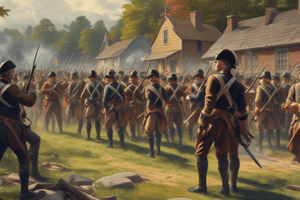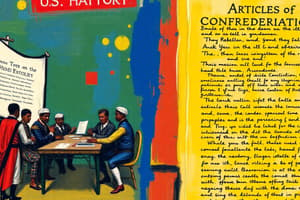Podcast
Questions and Answers
What was Shay's Rebellion?
What was Shay's Rebellion?
- A series of attacks on courthouses by farmers (correct)
- A political convention
- A peaceful protest against taxation
- A military coup
What was a major weakness of the Articles of Confederation?
What was a major weakness of the Articles of Confederation?
It left the federal government with no way to raise revenue.
Who was the head of Shay's Rebellion?
Who was the head of Shay's Rebellion?
Daniel Shays
What is James Madison known as?
What is James Madison known as?
What does the Spirit of 1776 represent?
What does the Spirit of 1776 represent?
What was the Virginia Plan?
What was the Virginia Plan?
What did the Great Compromise achieve?
What did the Great Compromise achieve?
Who was George Mason?
Who was George Mason?
What were the Federalist Papers?
What were the Federalist Papers?
Who was the first Secretary of the Treasury?
Who was the first Secretary of the Treasury?
What is the Bill of Rights?
What is the Bill of Rights?
What was the Dirty Compromise?
What was the Dirty Compromise?
What was significant about the Haitian Revolution?
What was significant about the Haitian Revolution?
What did Alexander Hamilton propose regarding a national bank?
What did Alexander Hamilton propose regarding a national bank?
What was the Whiskey Rebellion?
What was the Whiskey Rebellion?
Who was John Jay?
Who was John Jay?
What was Jay's Treaty?
What was Jay's Treaty?
What is impressment?
What is impressment?
Who was Edmond Genet?
Who was Edmond Genet?
What was the XYZ Affair?
What was the XYZ Affair?
What did the Alien Act allow?
What did the Alien Act allow?
What was the Sedition Act?
What was the Sedition Act?
What did the Kentucky and Virginia Resolutions declare?
What did the Kentucky and Virginia Resolutions declare?
What does disestablishment refer to?
What does disestablishment refer to?
What was significant about the Election of 1800?
What was significant about the Election of 1800?
Flashcards
Shay's Rebellion
Shay's Rebellion
Farmers' revolt against economic hardship during the early years of the US.
Articles of Confederation weaknesses
Articles of Confederation weaknesses
The document's flaws in establishing a strong central government, especially regarding taxation.
Daniel Shays
Daniel Shays
Leader of the rebellion, highlighting the economic struggles in the new nation.
James Madison
James Madison
Signup and view all the flashcards
Virginia Plan
Virginia Plan
Signup and view all the flashcards
Great Compromise
Great Compromise
Signup and view all the flashcards
George Mason
George Mason
Signup and view all the flashcards
Federalist Papers
Federalist Papers
Signup and view all the flashcards
Alexander Hamilton
Alexander Hamilton
Signup and view all the flashcards
Bill of Rights
Bill of Rights
Signup and view all the flashcards
Dirty Compromise
Dirty Compromise
Signup and view all the flashcards
Haitian Revolution
Haitian Revolution
Signup and view all the flashcards
Bank of the United States
Bank of the United States
Signup and view all the flashcards
Whiskey Rebellion
Whiskey Rebellion
Signup and view all the flashcards
John Jay
John Jay
Signup and view all the flashcards
Jay's Treaty
Jay's Treaty
Signup and view all the flashcards
Impressment
Impressment
Signup and view all the flashcards
XYZ Affair
XYZ Affair
Signup and view all the flashcards
Alien Act
Alien Act
Signup and view all the flashcards
Sedition Act
Sedition Act
Signup and view all the flashcards
Kentucky and Virginia Resolutions
Kentucky and Virginia Resolutions
Signup and view all the flashcards
Disestablishment
Disestablishment
Signup and view all the flashcards
Study Notes
Shay's Rebellion
- A revolt led by Daniel Shays and farmers protesting against foreclosures and debt imprisonment.
- This uprising highlighted the weaknesses of the Articles of Confederation, specifically the inability to raise revenue or maintain order.
Articles of Confederation Weaknesses
- Created a federal government lacking power to levy taxes, hindering its ability to function effectively.
Daniel Shays
- Revolutionary War captain who spearheaded Shay's Rebellion, fighting against economic injustices.
- His actions prompted landowners to seek a stronger federal government to avoid "mobocracy."
James Madison
- Known as the "Father of the Constitution," he played a pivotal role in drafting and promoting the Constitution and served as the fourth President.
Spirit of 1776
- Reflected an ideology of liberty and resistance to authority, reminiscent of the revolutionary fervor at the war's inception.
Virginia Plan
- Proposed by James Madison; a framework for government favoring populous states with representation based on population size.
Great Compromise
- Reached in 1787, establishing a bicameral legislature with proportional representation in the House and equal representation in the Senate.
George Mason
- Key figure in the American Revolution; his advocacy for individual rights led to the inclusion of the Bill of Rights.
Federalist Papers
- A series of essays written by Hamilton, Jay, and Madison aimed at securing ratification of the U.S. Constitution.
Alexander Hamilton
- First Secretary of the Treasury, instrumental in creating a national bank and establishing a federal financial system, including tax policies.
Bill of Rights
- The first ten amendments to the Constitution protecting individual liberties, drafted by James Madison in response to demands for greater protections.
Dirty Compromise
- Agreement ensuring protection of the slave trade for 20 years, in exchange for support from Southern states on legislative measures.
Haitian Revolution
- A significant event influencing Latin American revolutions; it was the first successful slave revolt, led by Toussaint L'Ouverture.
Bank of the United States
- Proposed by Hamilton, this institution aimed to stabilize the economy by managing taxes and providing a national currency; faced constitutional challenges.
Whiskey Rebellion
- 1794 uprising by Pennsylvania farmers against an excise tax on whiskey; showcased the federal government's ability to enforce law compared to the Articles era.
John Jay
- Diplomat and first Chief Justice of the United States; crucial in negotiating peace treaties and establishing judicial precedents.
Jay's Treaty
- Agreement brokered by John Jay to resolve disputes with Britain regarding ship seizures and debts, aiming to stabilize relations.
Impressment
- The British practice of forcibly enlisting American sailors into their navy, contributing to tensions between the U.S. and Britain.
Edmond Genet
- A French envoy who sought American support against the British, creating significant diplomatic challenges for the U.S.
XYZ Affair
- Diplomatic incident in which American diplomats faced bribery demands from French officials, escalating tensions between the U.S. and France.
Alien Act
- Enacted in 1798, granting the president powers to deport immigrants viewed as threats to national security.
Sedition Act
- Made it illegal to criticize the government; aimed at curbing dissent but sparked debates over First Amendment rights.
Kentucky and Virginia Resolutions
- Authored by Jefferson and Madison in response to the Alien and Sedition Acts, asserting state rights to nullify unconstitutional federal laws.
Disestablishment
- Period marked by the reduction of political power held by established religions, promoting separation of church and state.
Election of 1800
- Notable for being the first peaceful transfer of power between opposing political parties, marking a significant moment in U.S. political history.
Studying That Suits You
Use AI to generate personalized quizzes and flashcards to suit your learning preferences.





